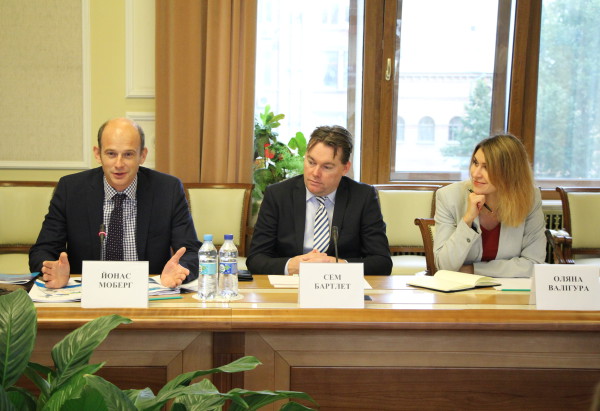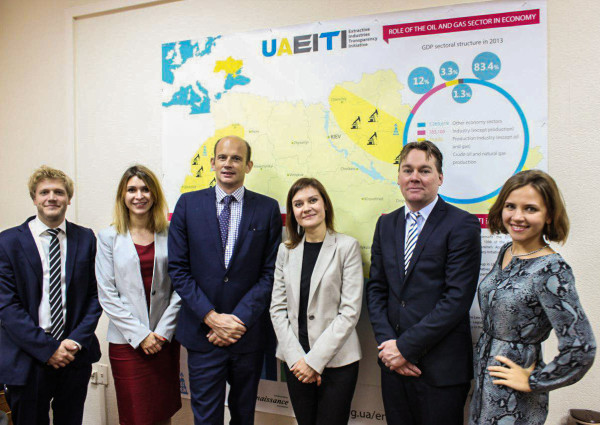After the 2014 Revolution of Dignity, Ukraine has heralded a new era of open government, through the EITI and other international commitments. With Ukraine’s elections drawing closer and reform-efforts are, according to some analysts, slowing down, begging the question: is this the beginning of the end for transparency in Ukraine’s extractive sector, or a move to a new and improved phase?
Ukraine became an EITI implementing country in 2013. Four years and two EITI Reports later, the country is undergoing EITI Validation, the quality assurance instrument of the EITI. Validation does not give all the answers, it does not even identify all weaknesses. However, it outlines what implementing countries do and do not cover in their most recent EITI Report, as well as documents whether the EITI process is functioning according to the EITI Standard. The below is a brief reflection on how Ukraine has progressed, and what needs to happen for the process to continue to deliver much needed reforms.
A peculiar change-maker
Ukraine’s implementation of the EITI, Ukraine EITI (UAEITI), stands out among EITI’s implementing countries. It is a country where civil society has significant access to key government decision-makers, both through the EITI and through their own volition. The country pursues concrete reforms that enjoy buy-in across government, civil society and the private sector. In Ukraine, stakeholders are not defined by whether they represent the government, a campaign group or large energy company, but whether they are reform-oriented or resisting change.
The EITI Report has been hailed as a great achievement by the three constituencies of Ukraine’s multi-stakeholder group (MSG). The Deputy Minister of Energy and Coal Industry Natalya Boyko added that the EITI Report “… is a ray of sun in the darkness”. During a meeting with the American Chamber of Commerce in Ukraine, a representative exclaimed: “EITI is one of the most successful reforms in Ukraine; it is a complete change of attitude towards transparency.” The UAEITI 2014-2015 EITI Report includes more data than ever about the coal, iron, manganese, and titanium sub-sectors of Ukraine, in addition to the oil and gas sectors and related transportation/transit. Also, the level of detail has increased since the first report and now includes data disaggregated by individual companies.
Reforming the legislation
The government embraces the EITI and continues to express their commitment. When we met with the Minister of Energy and Coal Industry, Mr. Igor Nasalyk, he made it clear that the EITI must enter a new phase and become a ‘green light for investors’ which remains the main priority of the government. To achieve this it is important that transparency continues to be the new norm.
Ms Olga Bielkova, a Member of the Ukraininan Parliament (Verkhovna Rada of Ukraine) and International EITI Board, is part of a parliamentary committee working to ensure Ukraine achieves these goals. The government’s 2020 Strategy Action Plan outlines some of the efforts to promote investments and increased domestic gas production. Amongst other important reforms, it highlights the need to pass the ‘EITI law’, otherwise known as Draft Law of Ukraine #6229 On disclosure of information in extractive industries. If passed, it requires companies to submit certain information or face substantial penalties. This will ensure comprehensive EITI Reports dealing head-on with challenges in data collection.
There are however also some new and worrying hurdles to the multiple leaps towards accountability. In March 2017, President Petro Poroshenko signed amendments to the Law of Ukraine On Corruption Prevention. The law from late 2016, forced government officials to declare their interests and assets. The amendments now include anti-corruption NGOs, who argue that the law could be used to hamper their ability to operate freely in relation to the EITI process. Some see this as a breach of EITI’s Civil Society Protocol’s section 2.2 and the law is therefore a potential suspension issue under the EITI Standard.
Ensuring a successful re-invention
To fulfil the government’s main objective for the EITI – attracting quality foreign direct investment – a robust process is needed. A process in which government coordinates its operations effectively across multiple agencies, in which companies share their concerns about government regulations or bureaucracy, and a process in which civil society operates freely to scrutinise the performance of the sector while ensuring local communities’ voices are heard. It is clear that UAEITI embodies this, and preliminary findings from an initial fact-finding mission are that Ukraine is making good progress.
The challenge for UAEITI now is to ensure that the process is used where it is most needed; it is time for UAEITI to face the sectors’ challenges head-on. Several stakeholders identify the licensing system, the process in which the government awards extraction-rights to companies, as the most pressing issue to tackle. It is complicated, bureacratic, unpredictable and prone to corruption. Although a reform-oriented government is undoubtedly a welcome sight in a post-revolution context, it also leads to challenges in procedures and regulations. An ever-changing legal and fiscal environment makes it difficult for companies to comply as there are overlapping reporting-requirements and uncertainty of current rules and procedures. This can potentially put investors off due to the increased risk it represents. A potential solution is for Ukraine to move towards mainstreamed disclosures which clarify the laws and regulations in real-time.
Another challenge are the many facets to the state’s participation in this sector. There are more than 50 state-owned enterprises (SOEs) mentioned in Ukraine’s EITI Report but it does not comprehensively report the full extent of financial relationships between these companies, nor between these SOEs and other government entities. If it wants to privatise several of its SOEs, it will be extremely important to clarify these arrangements to attract quality investors.
Lastly, the role of quality assurance in financial reporting in Ukraine is still unclear. How are government and corporate finances scrutinised, and does the EITI Report add value to the quality of information? UAEITI has a great opportuinty to tap into existing government agencies and their current work. Increasingly making use of the internal as well as independent audits performed by the State Audit Service and the Accounting Chamber can help reflect the true quality of EITI data and possibly improve government information on extractives as well as in other sectors.
The question for the national EITI process is whether the process is robust enough to tackle these challenges more ambitiously. The question for the international community is whether it has the determination to assist the reformers sufficiently in their quest to make the much-needed changes happen.
By answering ‘yes’ to these questions we can ensure that this is the end of the beginning for UAEITI, and a true re-invention of transparency in Ukraine.
Ukraine’s validation process commenced on 1 July 2017. From 18 to 22 September the EITI International Secretariat went on an initial fact-finding and stakeholder consultation mission to Ukraine, as part of this process. This blog is the results of the team’s first impressions from that mission.


